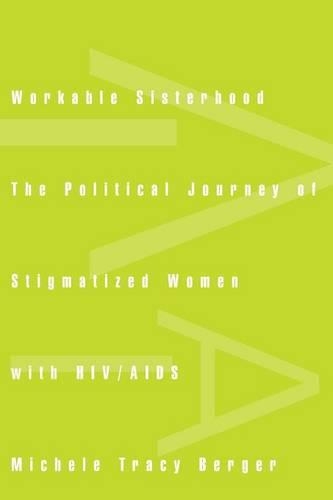
Workable Sisterhood: The Political Journey of Stigmatized Women with HIV/AIDS
(Paperback)
Publishing Details
Workable Sisterhood: The Political Journey of Stigmatized Women with HIV/AIDS
By (Author) Michele Tracy Berger
Princeton University Press
Princeton University Press
3rd October 2006
United States
Classifications
Professional and Scholarly
Non Fiction
Ethnic studies / Ethnicity
Gender studies: women and girls
Social discrimination and social justice
Racism and racial discrimination / Anti-racism
362.830973
Winner of American Political Science Association: Race, Ethnicity and Politics Award 2005
Physical Properties
Paperback
256
Width 152mm, Height 235mm
369g
Description
Workable Sisterhood is an empirical look at sixteen HIV-positive women who have a history of drug use, conflict with the law, or a history of working in the sex trade. What makes their experience with the HIV/AIDS virus and their political participation different from their counterparts of people with HIV Michele Tracy Berger argues that it is the influence of a phenomenon she labels "intersectional stigma," a complex process by which women of color, already experiencing race, class, and gender oppression, are also labeled, judged, and given inferior treatment because of their status as drug users, sex workers, and HIV-positive women. The work explores the barriers of stigma in relation to political participation, and demonstrates how stigma can be effectively challenged and redirected. The majority of the women in Berger's book are women of color, in particular African Americans and Latinas. The study elaborates the process by which these women have become conscious of their social position as HIV-positive and politically active as activists, advocates, or helpers.She builds a picture of community-based political participation that challenges popular, medical, and scholarly representations of "crack addicted prostitutes" and HIV-positive women as social problems or victims, rather than as agents of social change. Berger argues that the women's development of a political identity is directly related to a process called "life reconstruction." This process includes substance- abuse treatment, the recognition of gender as a salient factor in their lives, and the use of nontraditional political resources.
Reviews
Winner of the 2005 Best Book Award in Intersectionalities: Race, Gender, Ethnicity and Politics Category; Race, Ethnicity, and Politics Section of the American Political Science Association "This work would be a stellar accomplishment by any seasoned scholar. That this is Berger's sociological 'debut' ... is impressive and bodes well for future research into gender, inequality and deviance."--Tammy L. Anderson, Theoretical Criminology "Overall, Berger delivers a promising social science work that creatively challenges political and legal conceptions of stigma."--Lara Eilhardt, Berkeley Journal of Gender, Law & Justice "Michele Tracy Berger offers one of the first studies of the development of critical consciousness and political participation of women of color who are HIV positive... Her study is one of the first that I have read that centers on the experiences and political practice of women of color who are HIV-positive and who also face other challenges, such as recovery from drug abuse and sexual trauma... Her accessible writing style combined with the rich analytic framework contribute to the value of Workable Sisterhood for multiple audiences."--Nancy A. Naples, Perspectives on Politics "While this work is situated primarily within the feminist literature, and particularly within the literature pertaining to women of color, it brought new emphasis to the significance of the relationship between social identity and stigma... [T]his research ... points to a possibility for change that resides within many individuals society has written off as lost."--Betsy L. Fife, American Journal of Sociology "Berger's Workable Sisterhood ... demonstrates all the elements necessary to elevate an interview/ethnographic report beyond oral history."--Arthur W. Frank, Qual Sociol "This work ... brought new emphasis to the significance of the relationship between social identity and stigma... [T]his research, which Berger found challenging throughout, points to a possibility for change that resides within many individuals society has written off as lost."--Betsy L. Fife, American Journal of Sociology
Author Bio
Michele Tracy Berger is Assistant Professor of Women's Studies at the University of North Carolina, Chapel Hill. She has been a Robert Wood Johnson Foundation Health Policy Scholar at the University of California, Berkeley.
